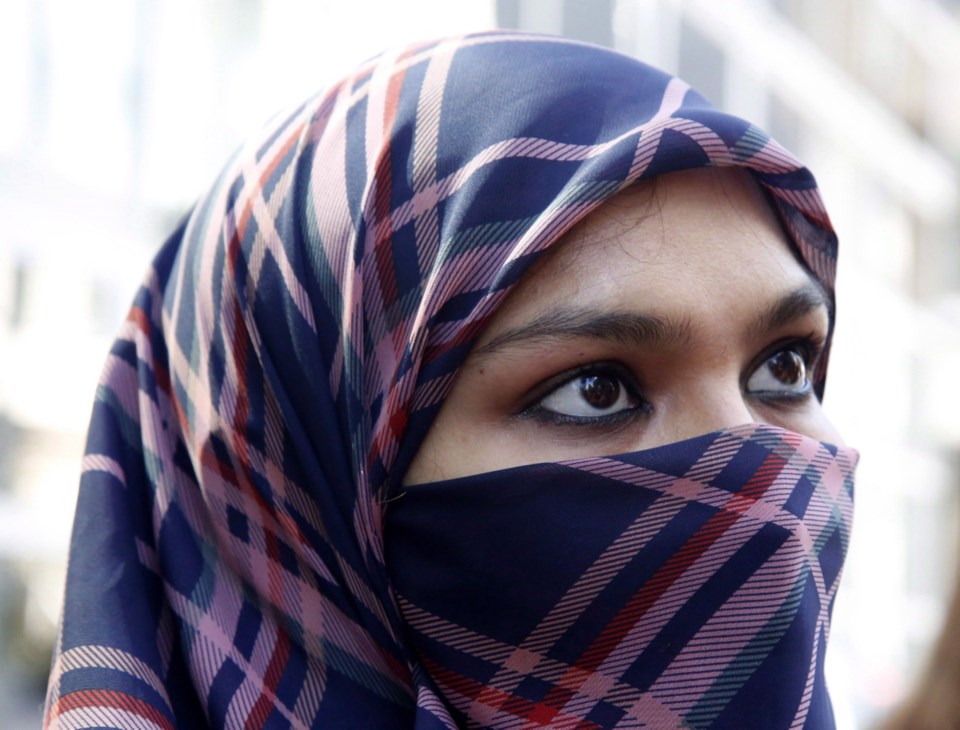 “Got one!” I hollered. “Got me a terrorist!” She sputtered and squirmed, protesting her innocence, but I kept her pinned under the table.
“Got one!” I hollered. “Got me a terrorist!” She sputtered and squirmed, protesting her innocence, but I kept her pinned under the table.
She had clearly ordered her Thanksgiving pumpkin pie “Allah mode” — which as we all know is Islamic terrorist for “God is ice cream,” a call to jihad, or niqab, or one of those frightening foreign words — so I was forced to take her down.
“Let me up before I file for divorce,” she said.
Must admit I wasn’t quite sure what a niqab was until the facial covering emerged as a major election issue, the Greatest Threat to Our Way of Life since 1990, when we were brought to our knees by the idea of Mounties being allowed to wear turbans.
Also, the scope of the menace seemed a tad underwhelming after it was pointed out that in the four years since the wearing of niqabs was barred at citizenship ceremonies, a total of two — count ’em, two — women have balked at the ban. (And hey, it’s not as though they showed up in something truly offensive, like Boston Bruins sweaters).
But no, no, we have decided that never mind the 75-cent loonie, unemployment, or the grey tsunami breaking over the health-care system, what we really have to get a grip on is this head-scarf thing before these foreign-looking (sorry, non-traditional) gals chase the Budweiser ads from Hockey Night in Canada.
Stephen Harper said last week that not only should the niqab be banned from citizenship ceremonies, but maybe people who work in or deal with the public sector shouldn’t be allowed to wear them either (not that any civil servants actually do so).
This came after the Conservatives promised a tip line to report “barbaric cultural practices” (what, like pouring tomato juice in beer?) and raised the spectre of terrorism as the reason for stanching the flow of Syrian refugees (even though our terrorists tend to be homegrown nut jobs, not imports).
These are the much-ballyhooed wedge issues being promoted in the name of traditional Canadian values, which seems kind of odd in that the seeds were planted by Muslim-bashing nationalists in Quebec.
Xenophobia has long played well in Quebec politics. (Remember when Jacques Parizeau blamed the Parti Québécois defeat on “big money and the ethnics”?) Pierre Trudeau saw this; it was his recognition of the thin line between nationalism and racism that led to his scorn for Quebec separatists and his belief in the supremacy of individual rights.
But then history shows xenophobia plays well everywhere. Fear of the outsider, the other, is a time-tested political motivator. The flip side of pride in the tribe (and we all have one) is suspicion, even demonization, of those who aren’t in it.
Fear makes people magnify threats that might not exist at all. In the aftermath of 9/11, we fluttered about as though everything from the legislature to the Dairy Queen was not just a potential target, but a probable one; we assumed Osama bin Laden had a to-do list that lumped the No. 17 Cedar Hill bus in with the White House and Heathrow Airport. The discovery of a handful of anthrax-laden letters in the U.S. spurred evacuations — the premier’s office, a building at CFB Esquimalt, the Salt Spring ferry — whenever an unexplained white powder was found.
Good lord, when we speak of “traditional Canadian values,” we like to conjure up an image of the Global Good Guy, imbued with level-headed decency, pioneering backbone, principled generosity. When did we turn into timid, scatter-brained, bed-wetting moral weaklings who can’t sit beside an Arab on an airplane without swallowing an Ativan?
The government’s own polling indicates that, whether they intended to push this as a hot-button issued or not, the Conservatives are on to a good vote-getter: 88 per cent of Canadians agree with the niqab ban, and a large majority agree that burqas and niqabs are symbols of oppression rooted in a culture that is anti-women.
And yes, seeing women wearing such garments on Douglas Street makes me uneasy, too. Why anyone would volunteer to dress in a way that seems demeaning? But what people choose to wear, to believe in, is none of my business, none of Stephen Harper’s and none of yours.
And on this Thanksgiving, I’m grateful that I’m not among the tiny group of Canadians being sacrificed for political purposes.



